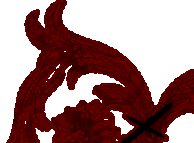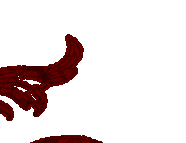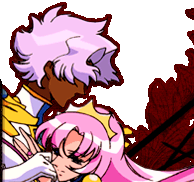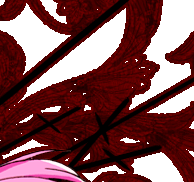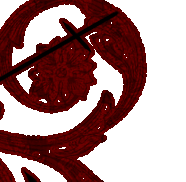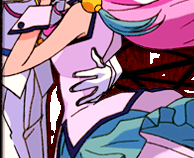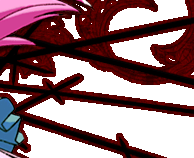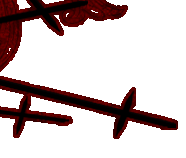
This analysis
was donated by Ryan Haecker.  Touga Kiryuu, Utena Tenjou, and Anthy Himemiya 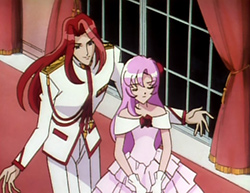 Touga Kiruu is the President of the supremely important Student Council, as well as the preeminent playboy at the Ohtori Academy. His social superiority is continually demonstrated through the superabundant admiration he receives from the girls on campus for whom he is referred to as "Mr. President". Touga's godlike charm and appearance are accentuated by his dandyish dress, stern poise, and frequent predilection to correct the moral and intellectual errors of his fellow council-members. Although Touga generally appears magnanimous, he occasionally reveals his hidden contempt for his friends whom he too willingly betrays for his own pleasures and ambitions. In the first saga of the Student Council arc Touga aspires to dominate the duels and gain the Rose Bride. Touga is repeatedly presented as the male equivalent of Utena Tenjou's princely nobility. The conflicted courtship of these two characters constitutes one of the principle dramas of the series. Touga has no genuine romantic fixations, yet his principal aspiration continues to be to gain the fantastic power to "Revolutionize the World". In spite of Touga's innate greatness and aristocratic superiority he is ultimately unable to gain this power and afterwards becomes a tragic hero as he reflects upon his former infantile romances with the naïve girls of the academy. The unrealizability of his sincere ambitions then reveals his philanderrings to have been no more than embarrassing vainglory-seeking. Touga cannot feasibly become the equal of Akio because, in spite of his talents, he is merely a man and therefore cannot open the Rose Seal or gain the "power to revolutionize the world". The recognition of the futility of his ambitions eventually leads him to reconsider his playboy lifestyle and, for once, act selflessly on Utena’s behalf.
Touga Kiruu is the President of the supremely important Student Council, as well as the preeminent playboy at the Ohtori Academy. His social superiority is continually demonstrated through the superabundant admiration he receives from the girls on campus for whom he is referred to as "Mr. President". Touga's godlike charm and appearance are accentuated by his dandyish dress, stern poise, and frequent predilection to correct the moral and intellectual errors of his fellow council-members. Although Touga generally appears magnanimous, he occasionally reveals his hidden contempt for his friends whom he too willingly betrays for his own pleasures and ambitions. In the first saga of the Student Council arc Touga aspires to dominate the duels and gain the Rose Bride. Touga is repeatedly presented as the male equivalent of Utena Tenjou's princely nobility. The conflicted courtship of these two characters constitutes one of the principle dramas of the series. Touga has no genuine romantic fixations, yet his principal aspiration continues to be to gain the fantastic power to "Revolutionize the World". In spite of Touga's innate greatness and aristocratic superiority he is ultimately unable to gain this power and afterwards becomes a tragic hero as he reflects upon his former infantile romances with the naïve girls of the academy. The unrealizability of his sincere ambitions then reveals his philanderrings to have been no more than embarrassing vainglory-seeking. Touga cannot feasibly become the equal of Akio because, in spite of his talents, he is merely a man and therefore cannot open the Rose Seal or gain the "power to revolutionize the world". The recognition of the futility of his ambitions eventually leads him to reconsider his playboy lifestyle and, for once, act selflessly on Utena’s behalf.
Touga Kiruu and Utena Tenjou each represent the preimminent aristocratic exemplars of Man and Woman. This is represented in the color scheme of the characters whose hair is red and pink. Touga is presented as the indisputable first man and ruler of the campus. The Student Council, of which he is the president, is presented with a megalomaniacal and millenarian importance overshadowing all other students, faculty and associations at the Ohtori Academy. At the start of the Student Council Saga Utena was repeatedly courted by Touga as he was visibly impressed by her miraculous victories in the arena duels. As a result, she later began to suspect him of being her Prince. The conflicting aspirations of Utena and Touga culminate in episode 12 when, at the height of their romantic intrigues, Touga challenged Utena to duel for possession of the Rose Bride. Touga’s charm momentarily disarmed Utena and then he alone succeeded in defeating her and wresting from her the Rose Bride. Utena is thereafter reduced from a princely tomboy to an average girl in a skirted uniform. Yet Utena’s devastating loss is soon thereafter transfigured into a renewed resolution to challenge Touga, the first of all men, for her friendship with Anthy Himemiya. In spite of Touga’s fantastic fencing skills Utena’s selfless aspiration for Anthy’s friendship again invoked the miraculous power of Dios through whom she, to Anthy’s great surprise, succeeded in defeating the President of the Student Council. The friendship of Utena and Anthy is restored. Yet having been once at the zenith of his power and prestige and then to have seen these inexplicably unmade before him, Touga is left devastated and humiliated with disappointment. The incomparable excess which he had flaunted at the height of his glory is then fittingly equaled in the gravity of his great melancholy and regret. Touga then leaves the stage, only to again reappear in the third story Arc.
Utena and Touga, as the foremost exemplars of mortal Man and Woman, represent in their dramas and personal aspirations the potentiality of the sexes to gain the miraculous power of Dios to revolutionize the world. Their frustrated romances likewise represent the misteps and follies of even the best men and women as their romantic aspirations intersect and conflict. Both princely characters are deluded by their romantic fixation upon the object of their utmost desire; the prince and the power; which misdirects their designs and estranges their mutual affection. As the Duel of the Revolution approached and Utena is placed in mortal danger, Touga chose to aid Utena rather than himself and, in an inverted repetition of his former duel, challenged Utena to duel to safeguard her from confronting Akio, “the End of the World”. Touga’s fantastic ambition to “Revolutionize the World” was then no nearer to him than for Akio, who remained infinitely superior. His disappointed ambition and collapsed arrogance is representative of the unrealizability of all fantastic millenarian ambitions which Byronic young men entertain. Yet through his willful self-sacrifice for Utena, the most proximate and realizable object of his mature affection, Touga restored his reputation as a sincere and esteemed gentleman.
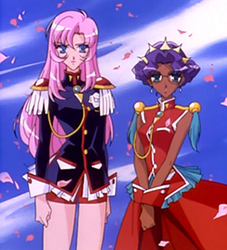 Utena Tenjou is an orphaned and assertive tomboy whose compassion for the Rose Bride motivated her to defend Anthy Himemiya from the other duelists. Utena was orphaned as a young girl when both of her parents died. Utena thereafter frequently recollected the funeral of her parents within a Christian gothic church. She recalled fetally curling up within a rose-filled coffin placed beside the closed coffins of her deceased parents. The coffin and the rose signify her childhood confinement. At this time Prince Dios appeared to her, apparently interceding on her behalf, and gave her the rose signet ring which would later inspire Utena to become a prince and liberate the Rose Bride. The absence of parental authority, the beginning of her princely ambitions, and her affection toward the Prince occur at the chronological beginning of Utena’s dramatic narrative and collectively signify the origin of her psychosexual maturation whose fruition is fated to arrive with the duels at the Ohtori Academy. Utena challenged the student council to many duels, yet her pride, princely ambition, and fierce loyalty to Anthy permitted her to long remain aloof from the tangled romances of these other characters. Several men court her yet for much of the show no man succeeds in winning her affections. Her unavailability and personal magnanimity nevertheless attracted to her the greatest of suitors whose affections she could not remain forever without. This dramatic conflict between Utena’s ambition to be a Prince who protects Anthy; her Princess; and her romantic longing to be the object of a man’s affection; a Princess; is a microcosm of the series’ broader conflict between the characters' autonomous individual actualization and their sexual determinism. When Prince Dios explained to a young Utena that the Witch was beyond his aid, she announced "then I will become a Prince and save her". Prince Dios then prescribed to Utena "If you never lose your nobility even when you grow up, then you may be able to save her from eternal torment", but warns "You are a girl. Eventually you will become a woman." to which Utena swore that she too would one day become a Prince.
Utena Tenjou is an orphaned and assertive tomboy whose compassion for the Rose Bride motivated her to defend Anthy Himemiya from the other duelists. Utena was orphaned as a young girl when both of her parents died. Utena thereafter frequently recollected the funeral of her parents within a Christian gothic church. She recalled fetally curling up within a rose-filled coffin placed beside the closed coffins of her deceased parents. The coffin and the rose signify her childhood confinement. At this time Prince Dios appeared to her, apparently interceding on her behalf, and gave her the rose signet ring which would later inspire Utena to become a prince and liberate the Rose Bride. The absence of parental authority, the beginning of her princely ambitions, and her affection toward the Prince occur at the chronological beginning of Utena’s dramatic narrative and collectively signify the origin of her psychosexual maturation whose fruition is fated to arrive with the duels at the Ohtori Academy. Utena challenged the student council to many duels, yet her pride, princely ambition, and fierce loyalty to Anthy permitted her to long remain aloof from the tangled romances of these other characters. Several men court her yet for much of the show no man succeeds in winning her affections. Her unavailability and personal magnanimity nevertheless attracted to her the greatest of suitors whose affections she could not remain forever without. This dramatic conflict between Utena’s ambition to be a Prince who protects Anthy; her Princess; and her romantic longing to be the object of a man’s affection; a Princess; is a microcosm of the series’ broader conflict between the characters' autonomous individual actualization and their sexual determinism. When Prince Dios explained to a young Utena that the Witch was beyond his aid, she announced "then I will become a Prince and save her". Prince Dios then prescribed to Utena "If you never lose your nobility even when you grow up, then you may be able to save her from eternal torment", but warns "You are a girl. Eventually you will become a woman." to which Utena swore that she too would one day become a Prince.
In defending and befriending Anthy, Utena intended to emancipate Anthy from her perpetual role as the Rose Bride. When the series began, Anthy presented herself to the champion duelist as wholly subservient, passive, and compassionate woman. After defending Anthy from abuse, Utena befriended her without the foreknowledge of Anthy’s cosmic significance. Utena intended to continually defend Anthy from the duelists while teaching her to be more assertive, self-actualized, and to eventually find new friends. Anthy Himemiya and Utena Tenjou represent archetypal expressions of two aspects of womanhood; Anthy represents the submissive maternal and libidinal Rose Bride and Witch while Utena represents the heroic and independent princely woman. The color scheme of Utena and Anthy reveals the parallelism of these characters. Anthy is continually portrayed as quietly submissive conjugal and defenseless while Utena is presented as athletic, martial, dignified and impregnable. The colors of Utena and her costumes are mimicked in darker and more saturated tones in Anthy. Utena’s pink hair, light skin and pink dress are mimicked in Anthy’s purple hair, dark skin and red dress. Moreover Utena’s athleticism and friendliness are inversely paralleled in Anthy’s shyness, homeliness and eye-glasses. Futhermore the imagery presented throughout the series is replete (especially in the opening and ending credits) with references to the psychological inseparability and unison of these characters. As with much else in the series, this imagery is as important as what is represented on stage.
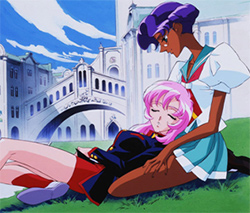 The engagement of Utena and the Rose Bride, followed by the images of their perpetual accompaniment such as holding hands and conjoined beds, continually alludes to the unison of these two aspects of womanhood in the spatio-temporal setting of the Ohtori Academy, just as the passive Anthy and the emancipatory Prince are united for one another as ideas in Utena’s self-consciousness. Neither passive Anthy nor Princely Utena are fully actualized in the world of the Ohtori Academy as a united and real self-consciousness. On the contrary, both Anthy and Utena remain throughout much of the series merely two reified aspects of the divided Platonic Idea of Womanhood. Anthy and Utena each contain within themselves an astonishing potential to realize the characteristics of their respective aspect of womanhood. Yet these aspects cannot be fully actualized merely through the realization of these characteristics. Instead this can only be achieved by them as they aspire towards their complete actualization through a psychological union with one another. Utena defended Anthy in the dueling arena and thereby retained her companionship with the Rose Bride. These duels are therefore a necessary pre-requisite for accomplishing Woman’s complete self-actualization. Utena and Anthy are each archetypal personifications of aspects of the transcendent Platonic Idea of Womanhood through which their dramatic conflict is elevated to a drama of all women. Insofar as Utena intends, through example and education, to inspire Anthy to become an autonomous woman her emancipatory role has the semblance of heroic feminism combating the abuses of concubinage and sexual determinism.
The engagement of Utena and the Rose Bride, followed by the images of their perpetual accompaniment such as holding hands and conjoined beds, continually alludes to the unison of these two aspects of womanhood in the spatio-temporal setting of the Ohtori Academy, just as the passive Anthy and the emancipatory Prince are united for one another as ideas in Utena’s self-consciousness. Neither passive Anthy nor Princely Utena are fully actualized in the world of the Ohtori Academy as a united and real self-consciousness. On the contrary, both Anthy and Utena remain throughout much of the series merely two reified aspects of the divided Platonic Idea of Womanhood. Anthy and Utena each contain within themselves an astonishing potential to realize the characteristics of their respective aspect of womanhood. Yet these aspects cannot be fully actualized merely through the realization of these characteristics. Instead this can only be achieved by them as they aspire towards their complete actualization through a psychological union with one another. Utena defended Anthy in the dueling arena and thereby retained her companionship with the Rose Bride. These duels are therefore a necessary pre-requisite for accomplishing Woman’s complete self-actualization. Utena and Anthy are each archetypal personifications of aspects of the transcendent Platonic Idea of Womanhood through which their dramatic conflict is elevated to a drama of all women. Insofar as Utena intends, through example and education, to inspire Anthy to become an autonomous woman her emancipatory role has the semblance of heroic feminism combating the abuses of concubinage and sexual determinism.
As Anthy is both the first woman and archetypal personification of the suffering of all women, her emancipation by Utena then embodies the historical dialectic between patriarchal obedience and liberal feminist autonomy. It is questionable whether Utena ever fully realizes the cosmic, rather than merely personal, significance of her role as Anthy’s liberator, and could thereby be correctly described as self-conscious feminist hero. The ahistoricity of “Revolutionary Girl Utena” in the fantastic cosmos of the Ohtori Academy implies that the series cannot be simply be interpreted as historically situated in the modern era. “Revolutionary Girl Utena” rather subtly avoids any explicit ideological references to feminism, while advancing Utena as a non-ideological and universal moral exemplar whose friendship with Anthy motivates her heroism.
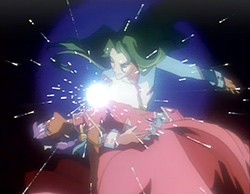 This interpretation of Anthy and Utena as the actual personifications of the divided Platonic Idea of Womanhood whose dramatic conflict is simultaneously a drama for the collective self-consciousness of all women as it has developed through history, reconciles the interpretive incongruity between Utena and Anthy as merely personal representatives of universal Ideas. Moreover, this interpretation explains the tremendous significance of Utena’s temporary estrangement from Anthy in episode 11 and why Utena found herself to be completely devastated, hollow and incapacitated by the loss of the Rose Bride. This is because the loss of the Rose Bride sunders Utena from the opposite aspect of divided Womanhood through whom she had defined and actualized herself in the Ohtori Academy. When, after gaining the Rose Bride in episode 12, Touga asks Utena why she wishes to duel with him Utena answers “to take back something important to me” to which Touga responds “I see. You wish to take back yourself.” Touga understood that the Rose Bride was necessary for Utena’s complete self-actualization yet plotted to seduce Utena with the thought that he was her Prince. During this climactic duel Touga summoned the power of the Rose Bride yet could not defeat Utena and as the power of Dios left Touga's sword, Anthy Himemiya wispered that she "has seen this before" and tears came to her eyes as she recollected the Prince, after which Utena miraculously triumphed over Touga with the intervention of Dios.
This interpretation of Anthy and Utena as the actual personifications of the divided Platonic Idea of Womanhood whose dramatic conflict is simultaneously a drama for the collective self-consciousness of all women as it has developed through history, reconciles the interpretive incongruity between Utena and Anthy as merely personal representatives of universal Ideas. Moreover, this interpretation explains the tremendous significance of Utena’s temporary estrangement from Anthy in episode 11 and why Utena found herself to be completely devastated, hollow and incapacitated by the loss of the Rose Bride. This is because the loss of the Rose Bride sunders Utena from the opposite aspect of divided Womanhood through whom she had defined and actualized herself in the Ohtori Academy. When, after gaining the Rose Bride in episode 12, Touga asks Utena why she wishes to duel with him Utena answers “to take back something important to me” to which Touga responds “I see. You wish to take back yourself.” Touga understood that the Rose Bride was necessary for Utena’s complete self-actualization yet plotted to seduce Utena with the thought that he was her Prince. During this climactic duel Touga summoned the power of the Rose Bride yet could not defeat Utena and as the power of Dios left Touga's sword, Anthy Himemiya wispered that she "has seen this before" and tears came to her eyes as she recollected the Prince, after which Utena miraculously triumphed over Touga with the intervention of Dios.
Akio appears for the first time in the dueling arena in the following episode, as he interrogates an image of a sleeping Prince Dio concerning the Utena's victory over the seventh duel named "self". He asks "You still haven't awakened? Is the world's shell still unbroken?" Throughout the series “Revolutionary Girl Utena” many characters make allusions to “awakening from their coffins” and “breaking the world’s shell”. These allegorical proclamations highlight the central dramatic theme of philosophic initiation through the attainment of wisdom and the overcoming of ignorance. As a child at her parents funeral in the gothic church, Utena is presented as lying asleep within a rose-filled coffin besides those of her parents. The enclosure of the coffin, whose dark confinement resembles death, symbolizes Utena’s childhood ignorance from which she aspires to be liberated. In episode 36 Saionji reveals that Utena has until then remained “trapped in her coffin” without full knowledge of the truth of Akio and Anthy. Along with the symbol of the coffin, the senility and corruption of an old world unfit for the youth is alluded to as the “world’s shell” which Akio and Touga both aspire to shatter with the coming of the “World Revolution”. Both the “coffin” and the “world’s shell” represent the barriers of habit, contentedness, and complacency which restrain the aspirations, innovations and revolutions of a new generation. G.W.F. Hegel examines the conflict between the spirit of innovation and the restraints of tradition in his lectures on “the Philosophy of History”:
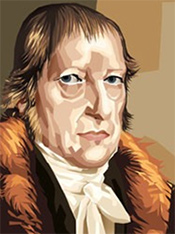
"Spirit, within its own self, stands in opposition to itself. It must overcome itself as its own truly hostile hindrance. The process of development, so quiescent in the world of nature, is for Spirit a hard and endless struggle against itself. What the Spirit wants is to arrive at the concept of itself; but it itself hides this concept from itself- and it is even proud and filled with joy in this self-estrangement... This source of World History is the inner Spirit that is as yet hidden beneath the surface; it knocks at the outer world as though that were a shell, and shatters it because that inner Spirit is a kernel that is different from the kernel in the outer world's shell... This is the drive, the internal impulse of spiritual life, the drive to break through its own shell of naturalness, sensuality, and self-estrangement, in order to arrive at the light of consciousness, its own selfhood." (G.W.F. Hegel, the Introduction to the Philosophy of History p.59-61)
 Progression of the Series 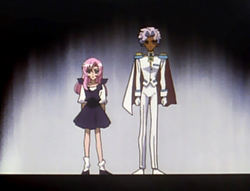 The philosophic initiation of the characters into the mysteries of the sexually charged duels, and the illusions surrounding the Ohtori Academy, is representative of these characters' psycho-sexual maturation from childhood fantasy into the adult knowledge of the real world. This psycho-sexual initiation echoes the Platonic ascent of the philosopher from the Cave of illusions to the world of the Real. In Plato's dialog "the Phaedrus", Socrates describes how learning wisdom is similar to the philosophic initiation of pederasty. As a wise man must teach his pupil that his thoughts are inadequate, the pupils' most intimate ideas must be exposed and humiliated before the pupil can attain true wisdom. This theme of philosophic and psycho-sexual initiation is represented in the three thematically distinct story arcs of "Revolutionary Girl Utena"; each of which contain distinctive psycho-sexual imagery. Each thematic arc represents a more advanced stage of romance and maturation. This narrative structure concludes in the final episodes, or the "Absolute Destiny Apocalypse", when the true meaning of the themes and cosmology of "Revolutionary Girl Utena" is revealed to Utena and the audience.
The philosophic initiation of the characters into the mysteries of the sexually charged duels, and the illusions surrounding the Ohtori Academy, is representative of these characters' psycho-sexual maturation from childhood fantasy into the adult knowledge of the real world. This psycho-sexual initiation echoes the Platonic ascent of the philosopher from the Cave of illusions to the world of the Real. In Plato's dialog "the Phaedrus", Socrates describes how learning wisdom is similar to the philosophic initiation of pederasty. As a wise man must teach his pupil that his thoughts are inadequate, the pupils' most intimate ideas must be exposed and humiliated before the pupil can attain true wisdom. This theme of philosophic and psycho-sexual initiation is represented in the three thematically distinct story arcs of "Revolutionary Girl Utena"; each of which contain distinctive psycho-sexual imagery. Each thematic arc represents a more advanced stage of romance and maturation. This narrative structure concludes in the final episodes, or the "Absolute Destiny Apocalypse", when the true meaning of the themes and cosmology of "Revolutionary Girl Utena" is revealed to Utena and the audience.
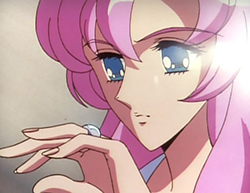 The first is the Student Council Arc with episodes 1 to 13, during which Utena duels with the members of the Student Council culminating in a two-part duel the Student Council President, Touga. These duels are openly challenged in person by the combatants. The conclusion of these duels are characterized by a loss of innocent expectations of idyllic romance. Much remains unexplained and modern machines rarely intrude into the fantasy-gothic setting. Throughout this arc, the characters retain an undisturbed psychic unity which is then fragmented upon their first loss of a duel. The childhood psychic unity is represented by the featurelessness of the arena which indicates that the romantic illusion remains believable.
The first is the Student Council Arc with episodes 1 to 13, during which Utena duels with the members of the Student Council culminating in a two-part duel the Student Council President, Touga. These duels are openly challenged in person by the combatants. The conclusion of these duels are characterized by a loss of innocent expectations of idyllic romance. Much remains unexplained and modern machines rarely intrude into the fantasy-gothic setting. Throughout this arc, the characters retain an undisturbed psychic unity which is then fragmented upon their first loss of a duel. The childhood psychic unity is represented by the featurelessness of the arena which indicates that the romantic illusion remains believable.
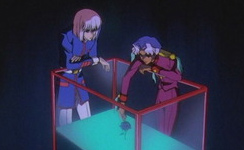 The second is the Black Rose Arc with episodes from 14 to 24, during which time Utena duels with the romantic partners of the Student Council. These duels are initiated by psychologically vulnerable and psycho-therapeutically manipulated characters whose challenge is issued in secret through a letter in Utena's locker. The psychologists’ ambition of self-discovery through ingenious research is the preeminent anxiety which mirrors modern man's uncertain understanding of himself. The imagery of these duels is of death, descent into an abyss, and self-negation and annihilation. The challenger's desire to duel arises after intense psychological introspection into the innermost macabre concepts of sadism, excess, and death. Throughout this arc the characters struggle with the consequences of their prior romantic humiliation, as well as the resulting fragmentation of their original psychic unity which is represented by the multitude of swiftly-collapsing desks holding aloft the objects of their desire.
The second is the Black Rose Arc with episodes from 14 to 24, during which time Utena duels with the romantic partners of the Student Council. These duels are initiated by psychologically vulnerable and psycho-therapeutically manipulated characters whose challenge is issued in secret through a letter in Utena's locker. The psychologists’ ambition of self-discovery through ingenious research is the preeminent anxiety which mirrors modern man's uncertain understanding of himself. The imagery of these duels is of death, descent into an abyss, and self-negation and annihilation. The challenger's desire to duel arises after intense psychological introspection into the innermost macabre concepts of sadism, excess, and death. Throughout this arc the characters struggle with the consequences of their prior romantic humiliation, as well as the resulting fragmentation of their original psychic unity which is represented by the multitude of swiftly-collapsing desks holding aloft the objects of their desire.
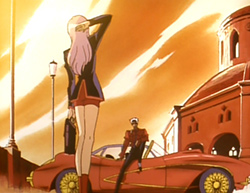 The third is the Akio Ohtori Arc with episodes from 25 to 39, during which Utena duels all of her former opponents in pairs. These duels are excitedly initiated by the Student Council members, as well as their lovers from the "Black Rose" arc, after a ride in Akio's supernatural automobile - his chariot of mystic enlightenment. This automobile ride with Akio represents an ecstatic initiation into the true meaning of love and romance. As it accelerates, the automobile approaches a distant of point on the horizon of absolute movement and intensity. This forthcoming singularity represents the climactic moment of consummation when the world dizzyingly drifts away and all that is left is the eternal present. The duelists who emerge from this experience appear with their latent potentiality actualized. The duelists then possess a fuller understanding of the truth of romance and the reality of the Ohtori Academy. Akio's automobile is a deus ex machina, a god-machine, with which he imparts the duelists with divine illumination of reality. This ride restores the duelists to their psychic unity after which they are initiated with a zealously renewed purpose and challenge Utena to one final duel, so as to wrest from her the Rose Bride and the power to revolutionize the world!
The third is the Akio Ohtori Arc with episodes from 25 to 39, during which Utena duels all of her former opponents in pairs. These duels are excitedly initiated by the Student Council members, as well as their lovers from the "Black Rose" arc, after a ride in Akio's supernatural automobile - his chariot of mystic enlightenment. This automobile ride with Akio represents an ecstatic initiation into the true meaning of love and romance. As it accelerates, the automobile approaches a distant of point on the horizon of absolute movement and intensity. This forthcoming singularity represents the climactic moment of consummation when the world dizzyingly drifts away and all that is left is the eternal present. The duelists who emerge from this experience appear with their latent potentiality actualized. The duelists then possess a fuller understanding of the truth of romance and the reality of the Ohtori Academy. Akio's automobile is a deus ex machina, a god-machine, with which he imparts the duelists with divine illumination of reality. This ride restores the duelists to their psychic unity after which they are initiated with a zealously renewed purpose and challenge Utena to one final duel, so as to wrest from her the Rose Bride and the power to revolutionize the world!

 |

